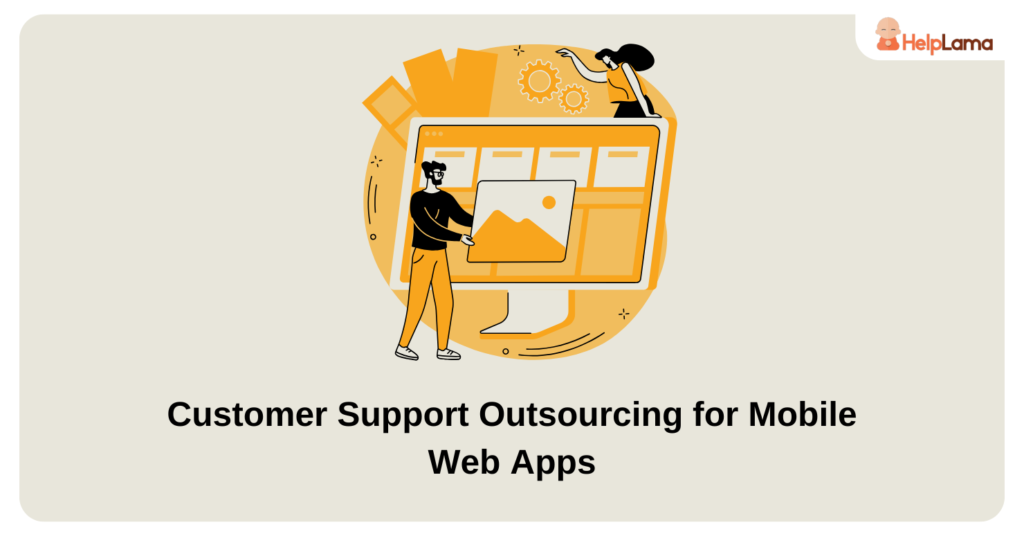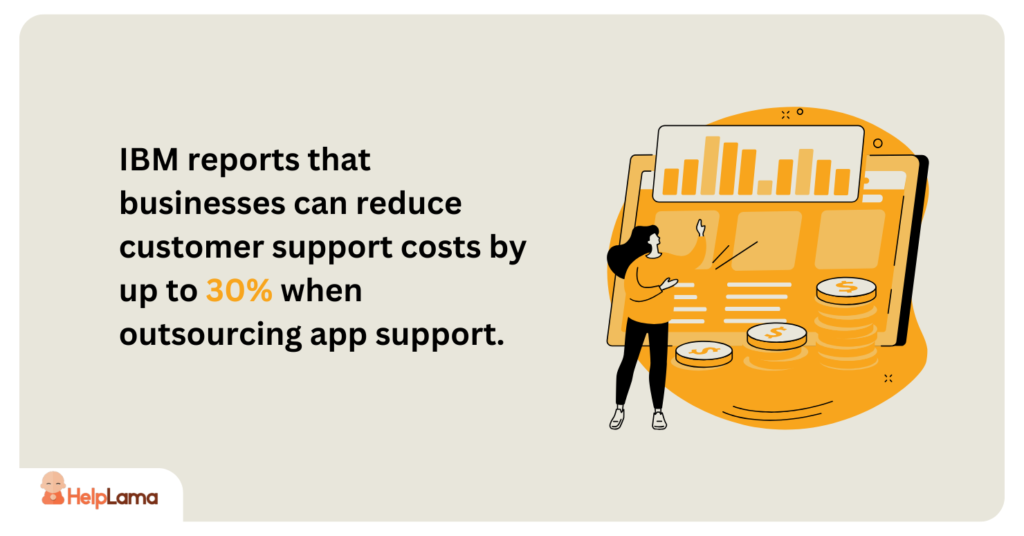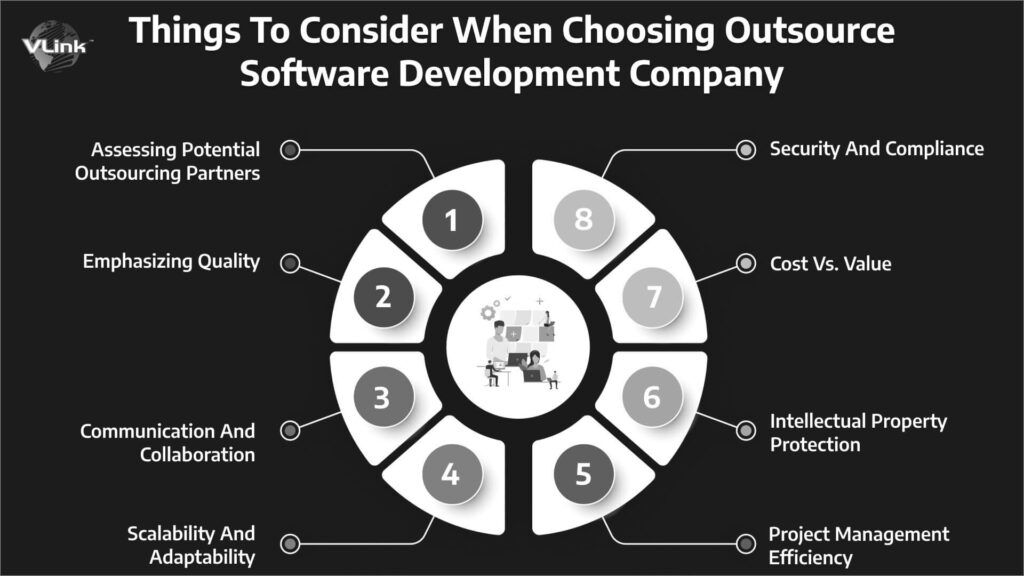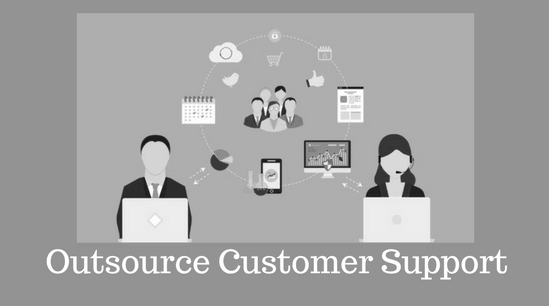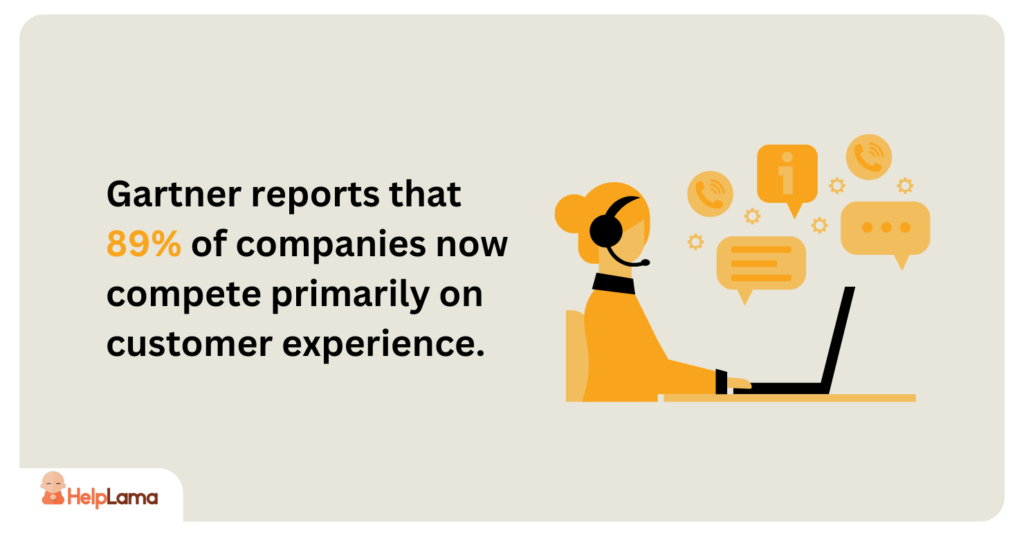Last Updated: April 2025
In today’s fast-paced digital world, delivering prompt and reliable customer service is no longer optional; it’s critical. IBM reports that businesses can reduce customer support costs by up to 30% when they outsource app support.
These statistics highlight why outsourcing is an increasingly attractive option for businesses running mobile web apps.
This blog explores the advantages, challenges, and best practices for outsourcing support operations. Whether you’re a startup looking to cut costs or an enterprise aiming to scale efficiently, understanding how to outsource app support effectively can be a game-changer.
Key Considerations Before You Outsource App Support
As mobile web apps grow in popularity, businesses need to ensure exceptional customer support. Maintaining an in-house team can be expensive and resource-intensive, which is why many companies prefer to outsource app support. Here are some key factors to keep in mind:
1. Understanding Your Users
Before engaging a third-party vendor, it’s crucial to understand your users’ behaviors, needs, and expectations. Are they primarily mobile users? Do they prefer chat or email support? The clearer your insights, the easier it will be to align outsourced services with user expectations.
2. Ensure a Dedicated Account Manager
A dedicated account manager can serve as your single point of contact, offering tailored assistance and ensuring your concerns are quickly addressed. They streamline communication, align performance goals, and increase the efficiency of your outsource app support strategy.
3. Evaluate Quality Control Standards
Choose a provider with a robust quality assurance (QA) framework. This includes regular performance audits, script compliance checks, and detailed analytics. QA ensures that the outsourced team delivers consistently excellent service.
4. Prioritize Data Security
Mobile app users often share sensitive personal data. Ensure your vendor is compliant with international data privacy standards like GDPR, HIPAA, or CCPA. Ask about their encryption protocols, access control, and breach response plans.
5. Transparent Pricing
Outsourcing can save costs, but it shouldn’t come at the expense of transparency. Compare multiple providers’ pricing models, monthly retainers, pay-as-you-go, or tiered plans. Make sure there are no hidden fees and that the level of support justifies the cost.
How to Choose the Right Partner
Choosing the right vendor to outsource app support can significantly impact customer retention and satisfaction. Here’s how to vet potential partners:
Comprehensive Support Options
Make sure the outsourcing provider offers multi-channel support, including live chat, phone, email, and social media. This ensures your customers can reach you through their preferred method at any time.
Technical Capabilities
Look for teams experienced in mobile web technologies, like PWA (Progressive Web Apps), responsive web design, and common app frameworks. They should be familiar with debugging, performance monitoring tools, and resolving app-specific issues.
Skilled Support Agents
Agent competence can make or break the user experience. Ask providers about their training process, domain knowledge, and soft skills development. Many businesses also run pilot programs to test how well agents handle actual customer queries.
SLA and Performance Metrics
Ask for detailed SLAs (Service Level Agreements) that outline response times, resolution times, uptime guarantees, and escalation processes. These metrics will help you monitor the efficiency of the outsource app support arrangement.
Tips for Managing Your Outsourced Support Team
Once you’ve hired a vendor, managing the relationship effectively is critical to getting the most value. Here’s how to do it:
1. Set Clear Expectations
Define key performance indicators (KPIs) like First Response Time (FRT), Average Resolution Time (ART), Customer Satisfaction (CSAT), and Net Promoter Score (NPS). Align these expectations with your vendor from the beginning.
2. Maintain Frequent Communication
Establish weekly check-ins or monthly performance reviews to discuss goals, feedback, and challenges. Use collaboration tools like Slack, Zoom, or Asana to keep communication flowing.
3. Monitor Real-Time Dashboards
Use analytics dashboards to track ticket volumes, resolution rates, and support quality in real time. This helps spot issues early and allows you to make data-driven improvements to your outsource app support strategy.
4. Encourage Customer Feedback
Gather direct feedback from users via post-interaction surveys or NPS forms. This will measure performance and identify improvement areas for the support team.
5. Implement Quality Assurance Audits
Conduct regular audits to ensure scripts are followed, tone remains professional, and solutions are accurate. These audits are crucial for long-term success and help maintain brand consistency.
How to Outsource Customer Support
Outsourcing customer support isn’t just about handing off tickets, it’s about building a scalable, reliable support engine. Whether you’re outsourcing for the first time or refining an existing process, here’s a step-by-step guide to doing it right:
1. Define Your Support Needs
Start by identifying what kind of support your users need. Is it 24/7 live chat, email support, technical troubleshooting, or multilingual service? Mapping out your requirements helps you filter vendors who offer exactly what you need.
2. Set Clear Objectives
Determine your goals, faster response times, better CSAT scores, or reduced cost per ticket. These metrics will later help you evaluate vendor performance and adjust strategies as needed.
3. Research and Shortlist Vendors
Look for vendors with proven experience in mobile web apps, strong client testimonials, and transparent pricing. Request case studies or ask for a pilot program to assess real-world performance.
4. Evaluate Communication and Culture Fit
Your outsourcing partner should feel like an extension of your brand. Consider time zone compatibility, communication style, and cultural alignment to avoid friction and delays.
5. Finalize SLAs and Contracts
Ensure that all expectations, KPIs, escalation paths, and uptime guarantees are written into your Service Level Agreement (SLA). It protects both parties and keeps performance on track.
6. Onboard and Train the Team
A detailed onboarding process is critical. Share product knowledge, brand tone guidelines, and tools. The more context your outsourced team has, the better the customer experience they can deliver.
Outsourcing customer support, when done thoughtfully, results in a win-win: happier users and a leaner, more focused internal team.
Cost for Outsourced App Support
Understanding the cost structure of customer support outsourcing services is key to making a financially sound decision. While pricing varies depending on complexity, channels, and support hours, here’s a breakdown of what to expect:
1. Per-Agent Model
Many providers charge a monthly rate per dedicated agent. This typically ranges from $1,200 to $3,000/month depending on the location, experience, and technical expertise of the agents. It’s ideal if you need consistent support with brand-trained staff.
2. Ticket-Based Pricing
Some vendors offer pricing based on the number of support tickets handled. For example, you might pay $0.80 to $2.50 per ticket, depending on volume and issue complexity. This model suits businesses with fluctuating support volumes.
3. Hourly or Pay-As-You-Go Rates
For short-term or part-time support, pay-as-you-go plans can be efficient. Rates range from $10 to $35 per hour, often with minimum usage commitments.
4. Hybrid or Tiered Plans
Larger providers of customer support outsourcing services may offer tiered packages combining chat, email, and voice support with scalable pricing. These are often bundled with value-added features like analytics, CRM integrations, or automation tools.
5. Hidden Costs to Watch For
Always ask about setup fees, training charges, overtime costs, and fees for multilingual support. Transparency is crucial to avoid budget surprises later.
Ultimately, the cost of outsourcing depends on your goals, whether it’s reducing expenses or enhancing user experience. With the right partner, investing in customer support outsourcing services can generate significant ROI by increasing retention, satisfaction, and operational efficiency.
FAQ
Q1: What does it mean to outsource app support?
A: It means hiring a third-party provider to manage customer service operations for your mobile web app, typically including tasks like troubleshooting, handling inquiries, and providing technical support.
Q2: What are the benefits of outsourcing app support?
A: It offers cost savings, access to experienced agents, 24/7 availability, and scalability. Most importantly, it frees up your internal team to focus on product development.
Q3: How do I choose the right vendor?
A: Look for providers with domain expertise, strong customer reviews, transparent pricing, and flexible support models that fit your business goals.
Helplama: Best Outsourced Gaming Customer Service Company
When it comes to outsourced gaming customer service, Helplama stands out as a top-tier provider trusted by fast-growing studios and publishers. With deep industry experience, Helplama understands the unique challenges of supporting players across time zones, platforms, and fast-paced in-game environments. Whether it’s managing high-volume support during game launches or moderating community forums, Helplama ensures your players always feel heard and supported.
Key Features:
- 24/7 Multichannel Support: Deliver real-time assistance across live chat, email, voice, Discord, and social media, even during peak gaming hours and events.
- Game-Savvy Agents: Trained in gaming lingo, platforms (PC, console, mobile), and community management. Helplama hires agents who play games.
- Proactive Player Engagement: Reduce rage quits and churn with automated alerts, personalized responses, and in-game event reminders.
- Bug Reporting & Triage: Identify and escalate bugs or glitches quickly with structured workflows, keeping your dev team informed in real-time.
- Community Moderation: Protect your brand and foster healthy communities across forums, Reddit, and Discord with trained moderators.
- Flexible Scalability: Easily ramp up during game launches, seasonal events, or eSports tournaments, then scale down without overhead stress.
- Custom Onboarding & SOPs: Agents are onboarded with step-by-step workflows tailored to your game mechanics, policies, and tone.
Helplama blends automation and a human touch to offer gaming studios a cost-effective way to boost player satisfaction while focusing on what matters most: building great games.
Conclusion
Outsourcing support services is no longer just a cost-cutting tactic, it’s a growth strategy. Gartner reports that 89% of companies now compete primarily on customer experience. When you outsource app support, you’re investing in round-the-clock service, faster problem resolution, and higher user satisfaction.
When done right, outsourcing can reduce your customer service costs by up to 50% while improving your brand’s reputation. Whether you’re launching a new mobile web app or scaling an existing one, the ability to outsource app support offers both agility and reliability.
Make sure to evaluate vendors thoroughly, monitor performance, and maintain strong communication channels. With the right approach, your outsourced team can become a valuable extension of your brand.

